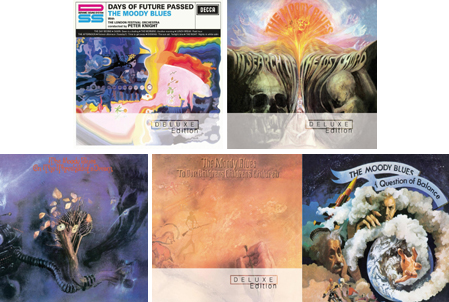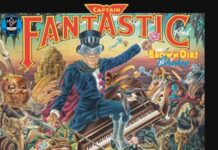I asked Justin Hayward during a 2004 interview if he would take a step back to 1967 and tell me what it was like to be in “swinging” London during that period. His reply was simple and straightforward. “Well you know what they say,” he offered. “If you can remember, you weren’t there.” Fair enough, but when it came to remastering the Moody Blues recordings, something else we touched on, Hayward didn’t forget the four seminal albums he worked on in the 60s: Days Of Future Passed (1967), In Search Of The Lost Chord (1968), On The Threshold Of A Dream (1969), and To Our Children’s Children’s Children (1969), along with 1970’s Question Of Balance. Now available as SACD hybrids and expanded with alternate takes, outtakes, live tracks, extensive liner notes, photos, and in the case of three of the five, an extra disc, these Moody Blues records clearly established a path the group would follow throughout their storied career — a vibrant orchestral flavor, a steady backbeat, sparkling guitars and glistening woodwinds, exceptional vocals, and well-crafted songs and musical passage contributions from each member.
After notching up a hit with “Go Now” and a slot supporting the Beatles in 1966, the Moody Blues entered a major decline. Things soon turned around after Justin Hayward and John Lodge came aboard, filling out a line-up that included Mike Pinder, Graeme Edge, and Ray Thomas. A new sense of exploration infused itself as the group abandoned their R&B sound and ventured into more ethereal territory. They were approached to record a rock version of Dvorak’s 9th Symphony with the London Festival Orchestra to demonstrate a new method of stereo recording. They seized the opportunity with relish…and a few ideas of their own. Given free rein in how the record would be created, they ended up making Days Of Future Passed, an original song cycle that revolves around a single day, climaxing with the epochal “Nights In White Satin.” The album established a precedent, not only for the Moody Blues, but for rock music in general — introducing a higher level of sophistication and musicality to a form normally targeted at teenagers. The Deluxe Edition sports all the trimmings — a magnificent 5.1 surround sound of the original album on a Super Audio CD and a second standard 19-track CD filled with alternate versions, outtakes, mono single masters predating the album, and various BBC radio sessions from 1967 and 1968.
In Search Of The Lost Chord, the second album from the same line-up, is heavier in the psychedelics department, but equally stirring and imaginative in its assault. After the sonic thrust of “Departure,” the record starts a-rocking with “Ride My See Saw” before morphing into the head trip experience of “House Of Four Doors,” “Legend Of A Mind,” with its nullifying chant of “Timothy Leary’s dead…”, the beatific “Visions Of Paradise” and “The Actor.” The Limited Edition is another two disc set. The first disc may or may not be a SACD, depending on who you ask. There’s no mention of SACD on the packaging. But the layer on the backside of the disc resembles a SACD, and my SACD player reads it as an SACD. Even so, it’s only a two-channel remix as opposed to a 5.1 surround sound mix, so you have wonder what’s the point of remastering this as a SACD. With 15 songs comprising outtakes, alternates, and BBC performances from 1968 on a second disc, no explanation is necessary.
Which brings us to On A Threshold On A Dream, the only single disc of the bunch, but seeping over with plenty of extras of its own, including a beautiful 5.1 surround mix of the original disc. Continuing their psychedelic misadventure, the Moody Blues engage in a bit of mind-blowing one-two punchin’ for “In The Beginning” and “Lovely To See You Again” — enough to send you on a bender with multi-dimensional possibilities. This record is heavily sustained by gobs of acoustic guitar, outweighing the famed Mellotron as the dominant instrument on the snappy “Send Me No Wine,” “Never Comes A Day,” Lazy Day,” and “Are You Sitting Comfortably.” Still, Pinder has the last word with the epic “Have You Heard” concluding the entire affair in grand style. Alternates, outtakes, and BBC spots add an additional nine tracks to the disc. This is a must-have for any Moody Blues fan.
To Our Children’s Children’s Children, the Moody Blues second album of 1969, would solidify the band’s status as psychedelic alchemists ready to stir the cauldrons of serendipity. Inspired by Apollo 11’s landing on the moon, the group embarked upon an exploration into the cosmos of their own, lifting off with Edge’s “Higher and Higher,” which opens with sound effects resembling a rocket. A myriad of styles and textures ensue — from the Thomas’ playful “Floating” to Hayward’s contemplative “I Never Thought I’d Live To Be A Hundred (later reprised as “I Never Thought I’d Live To Be A Million”) to Pinder’s effervescent “Sun Is Still Shining.” While including some of Hayward’s most stirring compositions, such as “Gypsy” and “Watching And Waiting,” To Our Children’s Children’s Children is best digested as a complete work, especially in its crisp, remastered 5.1 surround sound. The second disc features three alternates and outtakes from the album’s sessions, and is highlighted by eight tracks from a BBC radio concert from December 17, 1969. Here, the listener is treated to a wide cross-section of tunes, including the newly released “Gypsy,” along with other favorites like “Are You Sitting Comfortably,” Nights In White Satin,” and “Legend Of A Mind.”
In 1970, the Moody Blues peeled back the layers and brought things back down to the earth somewhat for Question Of Balance. That isn’t to say the record doesn’t feature its share of various Moody Blues’ trademarks, i.e., orchestration, the ubiquitous Mellotron, cerebral themes, etc. On the contrary, the opening “Question,” with its driving acoustic rhythm, is sustained by lush strings and horns. And yet, the instrumental embellishments are scaled back on others like “How Is It (We Are Here),” “Don’t You Feel Small,” “Tortoise And The Hare,” and “It’s Up to You.” The 5.1 surround sound shines through, while stereo mixes of the five bonus tracks, made up of alternates and outtakes, complete the package nicely.
The end result of these reissues is that virtually nothing has been held back. The five albums with their surround sound remixes and oodles of extras show a diversity and depth few groups possess. One can only hope that the same care and broad approach with be applied to the remainder of the Moody Blues’ catalog, especially the two albums from the early 70s — Every Good Boy Deserves Favour and Seventh Sojourn — which round out the “Core 7” so many fans praise and covet. Just as they did in the late 60s, the Moody Blues are once again at the forefront of technological innovation designed to the transport the listener to another dimension.
~ Shawn Perry




















